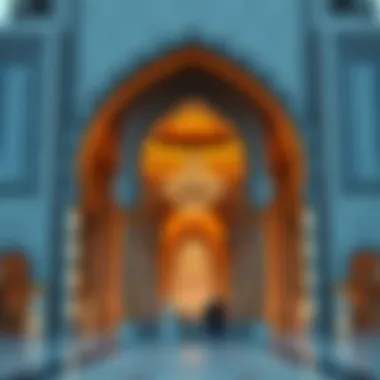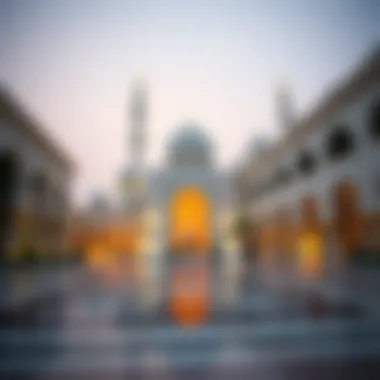Understanding Ramadan's Start in the UAE


Intro
The start of Ramadan holds profound significance for Muslims around the world, and particularly in the United Arab Emirates. This holy month, marked by prayer, reflection, and fasting, deeply influences daily routines, community interactions, and even the economy. Understanding when Ramadan begins is crucial, as it sets the tone for spiritual growth, compassion, and social responsibility.
In the UAE, the timing is determined by the lunar calendar and the sighting of the crescent moon, a practice that connects contemporary life with ancient traditions. As the holy month approaches, the excitement builds, shaping not just personal lives but also the landscape of commerce, real estate, and social engagements amid an ever-evolving market.
As we explore the nuances of Ramadan's start, it's essential to recognize how it reverberates throughout various sectors, offering unique insights into the cultural fabric of the UAE.
Intro to Ramadan in the UAE
Ramadan holds a profound significance in the United Arab Emirates, shaping the lifestyle and traditions of its people. As a holy month observed by Muslims around the world, it serves as a period of reflection, spiritual growth, and community engagement. In the innovative and cosmopolitan landscape of the UAE, Ramadan is perceived not only as a religious obligation but also as a time when cultural identity and modernity intersect. The observance of this month offers unique experiences for both locals and expatriates, providing a moment to come together in shared values and practices.
Historical Significance
Delving into the historical dimensions of Ramadan in the UAE reveals layers of cultural heritage. The origins of Ramadan stretch back centuries, with its significance enclosed in religious texts and traditions. Historically, fasting during Ramadan has been seen as a means of spiritual cleansing. Apart from its obvious religious essence, the tradition reflects the connection to the agrarian calendar, where fasting is aligned with the lunar cycle, as certain crops would dictate the pace of communal life.
In the UAE, Ramadan gained additional weight with the influence of Bedouin culture and the importance of community in traditional life. As the UAE transitioned through modernization, these foundations remained intact, evolving into a blend of ancient reverence and contemporary celebration. Events like the nightly Taraweeh prayers, which bring people together in mosques across the country, provide a sense of unity that reverberates through local communities.
Cultural Practices During Ramadan
Cultural practices during Ramadan in the UAE are a rich tapestry of traditions that demonstrate hospitality, generosity, and communal solidarity. One of the most cherished customs is the concept of Iftar, the evening meal that breaks the fast. Families and friends gather to share meals, often starting with dates and water, followed by an array of dishes that reflect both Emirati cuisine and global culinary influences. This act of breaking bread together reinforces bonds between individuals and families.
Moreover, various activities such as nightly markets fill the streets, showcasing local crafts, foods, and services, creating a vibrant atmosphere during the evenings. The communities come together, embracing not only the spirit of Ramadan but also allowing for cultural exchange.
In the realm of philanthropy, charitable actions peak during this month. Many individuals and organizations engage in giving, whether through donations to food banks or sponsorship of community iftars for those in need. Such actions embody the essence of Ramadan—selflessness and empathy toward others.
As the UAE continues to grow as a global hub, its approach to Ramadan reflects a unique and harmonious blend of age-old customs with modern trends, making it a captivating time for exploration and understanding.
"Ramadan is not just a month of fasting; it's a period where the threads of culture, history, and community weave tightly together in the fabric of Emirati identity."
In sum, the start of Ramadan in the UAE is not just about the spiritual journey it initiates for Muslims; it’s a profound culture-driven event that offers a glimpse into the heart of the nation's values and societal norms.
Lunar Calendar and Ramadan's Timing
The timing of Ramadan is intricate and deeply tied to the Islamic lunar calendar. This calendar, consisting of twelve months in a year of 354 or 355 days, is essential for setting the dates of religious observances. Unlike the Gregorian calendar, which is solar-based, the Islamic calendar is a moon-based structure. This means that every year, the start of Ramadan shifts by about ten to twelve days compared to the previous year. Understanding this shift is important for various aspects of life in the UAE, from business operations to cultural festivities.
Understanding the Islamic Calendar
The Islamic calendar has historical roots reaching back to the time of the Prophet Muhammad. It began in 622 CE when the Prophet made his Hijra, or migration, from Mecca to Medina. This journey marked a turning point in Islamic history, and the calendar reflects that significance. The months are intended to be alternately 29 or 30 days, depending on the moon's visibility, thereby emphasizing the importance of the lunar cycle.
Given the shorter year, the Islamic months do not correspond to the seasons, making for a unique experience each year. For instance, while some might eagerly anticipate a cool evening for iftar in winter, others may find themselves breaking fast under the blazing sun during the long summer days.
Understanding this calendar not only affects religious practices but informs social dynamics and even economic fluctuations in the UAE. It is crucial for planning events, holidays, and even retail strategies, as businesses often launch specific promotions aligned with Ramadan’s varying start dates.
Moon Sighting: A Traditional Method


One of the most cherished traditions in the UAE for signaling the start of Ramadan is moon sighting. This practice has roots steeped in cultural heritage and religious significance. As the month of Sha'ban concludes, many await the sighting of the crescent moon, which officially marks Ramadan's onset.
Traditionally, this involves individuals, often called "moon sighting committees", gathering in designated areas to look for the new moon. If the moon is spotted, announcements are made via mosques and media outlets, signaling the commencement of Ramadan.
"The crescent moon represents not just the beginning of a month, it signifies renewal, reflection, and the start of a sacred journey."
If the moon cannot be sighted, Ramadan begins the following day, following a well-established protocol. This blending of astronomical phenomena with religious observance emphasizes community participation and collective practice, reinforcing social bonds within neighborhoods and families. For investors, understanding the nuances of this tradition can offer insight into how Ramadan impacts not only cultural practices but also the retail landscape, as businesses prepare to cater to the heightened demand for iftar meals and other community activities.
The timing of Ramadan, dictated by these celestial observations, highlights a rich tapestry of tradition in the UAE, illustrating how the spiritual and practical aspects of life are intricately woven together during this holy month.
The Role of Religious Authorities
Religious authorities play a pivotal role in the observance of Ramadan, particularly in a religiously diverse nation like the United Arab Emirates. Their responsibilities extend beyond merely signaling the start of the holy month; they also encompass guiding the community in spiritual and practical affairs during this period. Understanding the nuances of this role offers insights not only into Islamic practices but also into the broader societal and economic effects that unfold during Ramadan.
Announcing the Start of Ramadan
The announcement of Ramadan’s onset is highly anticipated among Muslims. It signifies the beginning of fasting, reflection, and spiritual growth. In the UAE, the General Authority of Islamic Affairs and Endowments (GAIAE) holds the essential duty of declaring the start of Ramadan. This announcement typically follows the traditional practice of moon sighting, where qualified observers look for the crescent moon, indicating the new lunar month.
The authority employs both religious leaders and community volunteers in this process. The integration of technology through micro-photographs and reports enhances their efforts, ensuring that information reaches the populace efficiently.
Often, this announcement is broadcast across multiple media platforms, underscoring its importance. A simple, yet powerful statement can generate a wave of emotion and anticipation:
"Ramadan is here, a time for fasting, prayer, and spiritual renewal."
A well-coordinated declaration helps align the community, fostering a sense of unity. Businesses and schools adjust their schedules based on this announcement, driven by the traditional customs governing working hours in Ramadan.
Community Involvement in Ramadan Preparations
Involving the community is another critical aspect of how religious authorities operate during Ramadan. Local mosques often serve as centers for gathering and preparation. Here’s how community participation manifests:
- Volunteer Opportunities: Mosques usually organize food drives and Iftar meal preparations for those in need. This inclusiveness benefits both the volunteers and those they serve.
- Educational Workshops: Authorities conduct workshops on the significance of Ramadan’s practices, including the spiritual dimensions of fasting. These sessions aim to deepen the community's understanding while providing practical tips on maintaining health during the month.
- Outreach Programs: Engaging diverse community members, including expatriates and interfaith groups, allows for cultural exchange. This furthers the spirit of Ramadan, inviting everyone to partake in its values of generosity and compassion.
To illustrate the impact, consider the example of local school initiatives where students prepare care packages for underserved families. This not only reinforces the values of charity but also involves younger generations in the festive spirit.
The stronger the community ties during Ramadan, the more profound the impact on social fabric and cohesive harmony across diverse backgrounds. Religious authorities truly anchor this essential interactivity, enabling not just adherence to traditions but a celebration of collective identity.
Economic Impact of Ramadan in the UAE
The onset of Ramadan marks a distinct period of transformation in the United Arab Emirates. From a bustling retail environment to significant charitable efforts, the economic impact is palpable and multifaceted. Ramadan shapes not just personal habits and beliefs, but also various industries that thrive during this holy month. It stands as a time for reflection, charity, and community that essentially enhances economic activity while laying the groundwork for long-term development within the country.
Retail Sector Trends
During Ramadan, the retail sector experiences a noticeable shift in consumer behavior. The evenings, particularly, morph into vibrant bazaars where people flock to buy traditional foods, clothing, and gifts. Grocery stores witness an uptick in sales of items like dates, specialty meats, and traditional sweets. As people prepare for Iftar, the breaking of the fast, local markets might see hoards of families shopping for ingredients to create feast-like meals.


The allure of Ramadan sales events cannot be ignored either. Retailers capitalize on the spirit of giving and community gatherings, upping their marketing strategies with discounts and promotions. For instance, malls often host festive events, and this drives foot traffic, creating a win-win scenario for shoppers and businesses alike.
> "The true essence of Ramadan is reflected in its ability to foster community spirit through commerce."
Real Estate Market Fluctuations
Ramadan also brings a peculiar rhythm to the real estate market in the UAE. As families tend to gather and host events during the holy month, there's often a rise in demand for larger living spaces suitable for hosting Iftar dinners and gatherings. Rental prices might see a temporary surge as landlords capitalize on the increased demand.
Moreover, real estate developers sometimes roll out special promotions for new properties or enhancements in existing ones during this period. This tactic not only helps in boosting sales but also encourages people to consider upgrading their living situations, especially as families celebrate together. However, this uptick usually normalizes once the month concludes, leading to periodical fluctuations typical within the industry.
Charitable Contributions and Philanthropy
One of the most profound impacts of Ramadan is the way it evokes a spirit of giving. Charitable organizations often see a significant boost in donations during this time. Many families engage in zakat—the practice of giving a portion of their wealth to those in need. This typically increases financial support for various charitable initiatives from food distribution to medical aid.
Businesses frequently participate too, launching their own charitable campaigns. A notable trend is companies organizing iftar events, where they invite communities to share meals, further cementing relationships with their customers and the community at large. Supporting local charities during Ramadan not only benefits those in need but also enhances the brand's image, embedding it deeper in the society it serves.
Social Dynamics During Ramadan
During Ramadan, the social fabric in the UAE transforms significantly as the month is marked not only by fasting but also by community and cultural dynamics. Understanding the importance of these social elements provides insight into how Ramadan influences relationships, traditions, and shared experiences. The communal aspect of Ramadan fosters connections among families, friends, and even strangers, strengthening social bonds that may otherwise become diluted in everyday life.
Community Gatherings and Iftar
One of the most notable practices during Ramadan is the gathering of people for Iftar, the meal that breaks the fast at sunset. Iftar is not merely an act of nourishment; it serves as an essential social event, where family and friends reunite to share food and stories. Homes often fill up with loved ones, as rolling out a sprawling buffet becomes a symbol of hospitality and generosity. In fact, many residents of the UAE prepare elaborate spreads that feature traditional delicacies like dates, harees, and omboona (a type of spiced soup).
Local mosques also play a vital role in facilitating community Iftar events. Many mosques set up tables and chairs, inviting those who may be alone or who seek a sense of togetherness. This practice exemplifies the emphasis on inclusivity and support that characterizes the month.
"Fasting is not just about abstaining from food and drink. It’s about embracing fellowship and fostering empathy."
Moreover, corporate entities and organizations often step in as well, sponsoring community Iftar parties to promote team bonding and goodwill among employees. This collective experience during Iftar helps in reinforcing a sense of belonging, a sentiment particularly meaningful in the culturally diverse environment of the UAE.
Cultural Exchange and Interfaith Engagement
Ramadan is not a solitary experience confined to the Muslim community; it opens doors to broader cultural exchanges. In the UAE, where a vast array of nationalities coexist, Ramadan promotes interfaith understanding and dialogue. Many non-Muslims join in the festivities by attending Iftar dinners, participating in community events, or simply taking the time to learn about the practices surrounding Ramadan.
Cultural exchange occurs on multiple levels: from sharing meals to discussing the significance of the month. This atmosphere fosters respect and awareness of different faiths, as people engage in open discussions about their beliefs and customs. Schools often facilitate programs that educate students about Ramadan, encouraging students to appreciate the varying perspectives and practices surrounding this holy month.
In addition, various community organizations and NGOs work diligently to create initiatives aimed at bridging cultural divides. Workshops and events focused on interfaith dialogue have become more prevalent, demonstrating a conscious effort to cultivate an environment of mutual respect.
Consequently, the social dynamics during Ramadan in the UAE not only create a sense of community among Muslims but also invite others to partake in the shared values of empathy and kindness, enriching the cultural tapestry of the nation. By embracing these interactions, individuals contribute to a more cohesive society, where diverse histories and experiences blend harmoniously.
Daily Life Adjustments in Ramadan
Ramadan is not just a month of fasting; it marks a profound shift in daily routines and social interactions within the UAE. The importance of these adjustments cannot be overstated. For many, it is a time of spiritual reflection, communal activities, and a reevaluation of priorities. The challenge lies in harmonizing work, education, and cultural commitments while engaging in religious practices.


The adjustments made during Ramadan serve various purposes. They respect the significance of the holy month and cater to the needs of both Muslim and non-Muslim communities. For individuals who observe the fast, these changes facilitate a smoother transition during a period that is both sacred and demanding.
Work Hours and Schedules
During Ramadan, typical work hours in the UAE are tweaked to accommodate fasting. Government institutions generally see a reduction in hours, often adopting the schedule from 9 AM to 2 PM. On the other hand, private sector businesses follow suit, although the hours might differ based on the company culture and employee needs.
The aim is to help employees balance their professional responsibilities with the spiritual demands of fasting. This readjustment has far-reaching impacts:
- Employee Well-Being: Shorter hours help reduce fatigue and promote productivity. Employees can manage their workloads while still having the time to break their fast and attend evening prayers.
- Community Engagement: With earlier work hours, individuals have the opportunity to participate in community events and family gatherings, fostering a sense of togetherness during the holy month.
The cultural importance of being flexible with work timings cannot be overlooked. It reflects respect for the values that underpin Ramadan while also recognizing the diverse work environment present in the UAE.
Schooling and Education Adjustments
Education systems also adapt during Ramadan, with both schools and universities modifying their schedules. For instance, many schools alter their timings, often starting later in the morning and ending much earlier in the afternoon. This change eases the burden on both students and teachers, allowing them to engage fully in the fasting experience without the stress of long instructional hours.
The benefits of these adjustments in educational settings include:
- Enhanced Focus: Shorter class sessions can lead to better concentration since fasting students are less fatigued and are likely more alert during the times they are in class.
- Activities and Community Service: Schools may organize hygiene and charitable activities, encouraging students to give back to the community, promoting values of generosity and solidarity.
These thoughtful adaptations to daily life during Ramadan not only respect the month’s spiritual significance but also enhance the community's cohesiveness, making it a period of reflection, learning, and togetherness.
"Ramadan is about turning toward spirituality and community, while still navigating the demands of everyday life. In the UAE, these adjustments signify respect for diverse cultures within a unified framework."
Overall, both work and educational reforms play a crucial role in shaping the character of Ramadan in the UAE, reflecting the balance between personal faith and societal responsibilities.
The Future of Ramadan Observances
The future of Ramadan observances in the UAE stands at an intriguing crossroad, merging tradition with change. As society evolves, the way people celebrate and honor this holy month is likely to adapt, reflecting broader global trends while still preserving the essence of Islamic practices. The significance of discussing the future of Ramadan is paramount for a variety of stakeholders, especially for those involved in business, community development, and cultural exchange. Understanding these future trends can facilitate better planning and engagement for investors, buyers, agents, and developers.
Emerging Trends in Contemporary Celebrations
As time marches on, the celebrations of Ramadan are increasingly influenced by various social and economic factors.
- Globalization of Traditions: With an influx of people from various backgrounds, Ramadan observances are becoming more diverse. Events that blend different cultural practices alongside traditional Ramadan elements are becoming commonplace. For instance, social media campaigns are prompting a marketing shift to interlink modern aesthetics with ancient traditions.
- Community Festivals: More neighborhoods are hosting large iftar gatherings and themed festivals, which attract visitors from across the emirates. These events can strengthen community bonds and offer local businesses a platform to showcase their products, thus boosting the economy.
- Health and Wellness Focus: The rising awareness of health is prompting many to adjust their iftar menus. By incorporating healthier options alongside traditional dishes, families are becoming more conscious of their dietary choices during the fasting period.
By embracing these trends, communities can create a more inclusive and vibrant social fabric during Ramadan that resonates with both local and expatriate populations.
Impact of Technology on Ramadan Practices
Technology is reshaping the way people observe Ramadan in profound ways. Here are some notable impacts:
- Digital Iftar: Live streaming iftar meals has become popular, allowing people separated by distance to still gather virtually. This innovation keeps the spirit of communal sharing alive, even in a digital landscape.
- Mobile Apps for Prayer Times: In today’s fast-paced world, many rely on technology to keep track of prayer times and fasting schedules. Smartphone apps provide timely alerts, enhancing the spiritual experience by helping followers stay connected to their faith.
- Social Media Engagement: Platforms like Instagram and Facebook see Ramadan-themed content surge every year. From sharing personal reflections to recipes for breaking the fast, digital spaces encourage interaction and communal experiences.
- E-commerce Growth: As more people turn to online shopping for Ramadan necessities, businesses are adapting their marketing strategies to capture this new consumer trend effectively.
In essence, the technological influence that integrates both convenience and community-oriented practices enriches the Ramadan experience for many. By understanding these dynamics, investors and developers can anticipate future needs and tailor their offerings accordingly.
"The evolution of Ramadan is not just about keeping up with the times; it's about creating a meaningful blend of past and present that resonates with all involved."
As we look ahead, observing how these trends play out can guide many in navigating the complex landscape of Ramadan while respecting its rich heritage.











